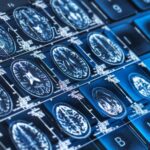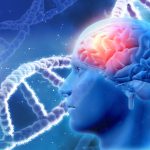By age 60, 50 percent of people with Down syndrome will develop Alzheimer’s disease. To wrap up National Alzheimer’s Disease Awareness Month, we ask Ben Handen, Ph.D., associate professor of psychiatry at the University of Pittsburgh School ofMedicine, to answer a few questions about this striking statistic.
Q: Why is someone with Down syndrome at greater risk for Alzheimer’s disease?
A: We know that the presence of amyloid plaques in the brain is often associated with the development of Alzheimer’s disease. The gene that codes for the amyloid protein is on the 21stchromosome. Since individuals with Down syndrome are born with three copies of the 21stchromosome, it’s likely that they are making a greater amount of amyloid then do individuals in the general population. As a result, a significant number of adults with Down syndrome develop signs of Alzheimer’s disease when they reach middle age.
A: We know that the presence of amyloid plaques in the brain is often associated with the development of Alzheimer’s disease. The gene that codes for the amyloid protein is on the 21stchromosome. Since individuals with Down syndrome are born with three copies of the 21stchromosome, it’s likely that they are making a greater amount of amyloid then do individuals in the general population. As a result, a significant number of adults with Down syndrome develop signs of Alzheimer’s disease when they reach middle age.
Q: But not everyone with Down syndrome will develop dementia, right?
A: That’s correct – and some healthy individuals develop significant levels of amyloid plaque in their brains and don’t show signs of dementia. We still have a lot to learn in this field. But it’s very unusual to have a population where half of the individuals will develop a disease. That means studying the Down syndrome population may help us shed some additional light on what causes Alzheimer’s disease – and how we can prevent and/or cure it.
Q: What research is currently being conducted to learn more about this connection?
A: We’re currently conducting a study titled “Natural History of Amyloid Deposition in Adults with Down Syndrome.” The goal is to evaluate individuals with Down syndrome who are free of symptoms of dementia or Alzheimer’s disease and to follow them for five or more years. The study involves both neuropsychological testing and imaging amyloid via scans of the brain.
Q: What do you hope to determine from this study?
A: Our hope is to begin to understand how early cognitive, adaptive and behavioral signs of Alzheimer’s disease are related to amyloid deposition in the brain. In addition, we hope to identify factors that may increase the chances that an individual will develop Alzheimer’s as well as factors that may be protective for individuals.








